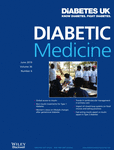Journal list menu
Export Citations
Download PDFs
Issue Information
Editorial
Invited Reviews
Non-insulin treatments for Type 1 diabetes: critical appraisal of the available evidence and insight into future directions
- Pages: 665-678
- First Published: 22 February 2019
- Multiple therapeutic options have been developed and approved for the treatment of Type 2 diabetes, and are used as adjunctive therapies to insulin in Type 1 diabetes. We review the current evidence on such therapies and evaluate their utility as a strategy to reduce the drawbacks of intensive insulin therapy and potentially reduce complications in Type 1 diabetes.
- Individualization of the care of people with diabetes is now emphasized more than ever, with adjunctive therapies now available to address previous unmet needs. Clinicians are able to weigh the advantages and hypothetical long-term benefits of such treatments against the known elevated risks of acute complications and uncertain long-term effects.
Beyond HbA1c: using continuous glucose monitoring metrics to enhance interpretation of treatment effect and improve clinical decision-making
- Pages: 679-687
- First Published: 08 March 2019
- Continuous glucose monitoring (CGM) captures individual variation in glucose control and provides complex data streams that require appropriate analysis.
- Time in range is increasingly a focus for outcomes in clinical trials and is accurately measured by CGM.
- Measures of glycaemic variability are important elements of CGM analysis and are responsive to different therapeutic interventions
- Risk of hyperglycaemia and hypoglycaemia need to be considered in addition to time in range.
Systematic Review or Meta-analysis
Assessing the severity of Type 2 diabetes using clinical data-based measures: a systematic review
- Pages: 688-701
- First Published: 22 January 2019
- Assessing diabetes severity is important and could help identify people in need of targeted therapies and benchmark healthcare services.
- This is the first systematic review of measures quantifying Type 2 diabetes severity. More severe diabetes was associated with greater risks of hospitalization and mortality. Assessment of diabetes severity using real-world electronic health records is under-researched and underutilised in clinical care. None of the studies in the review compared the utility or performance of the developed measures with those of currently-used indices, mainly HbA1c.
- Health records are suitable for assessment of diabetes severity. Contemporary, actionable and validated disease-specific severity measures in large diabetes cohorts are needed.
Women's views on lifestyle changes to reduce the risk of developing Type 2 diabetes after gestational diabetes: a systematic review, qualitative synthesis and recommendations for practice
- Pages: 702-717
- First Published: 05 February 2019
- After having had gestational diabetes, many women do not adopt healthy lifestyles that would reduce their risk of developing Type 2 diabetes.
- We found, in summary, that women identified themselves primarily as mothers who prioritized their family above themselves, and needed resources, time, energy, information and support to encourage healthy diets and levels of activity.
- Based on these findings, we developed 20 recommendations for effectively promoting healthy lifestyle in this population. These recommendations highlight the need for interventions to be centred on women's needs and experiences.
Research Articles
Complications
Cardiovascular disease prevalence and risk factor prevalence in Type 2 diabetes: a contemporary analysis
- Pages: 718-725
- First Published: 23 September 2018
- There have been substantial advances in the management and prevention of cardiovascular disease in diabetes. To understand where unmet needs lie, it is important to understand the current burden of cardiovascular disease and the levels of treated and untreated risk factors.
- In this paper, we show that there continues to be a high prevalence of cardiovascular disease among people with Type 2 diabetes and a high level of unmet need for risk factor control. This implies substantial scope for reducing the excess risk of cardiovascular disease in diabetes through improved management of known risk factors.
Health Economics
A perspective on global access to insulin: a descriptive study of the market, trade flows and prices
- Pages: 726-733
- First Published: 19 March 2019
- Very little is known about the global insulin market and its possible impact on access to insulin in a given country.
- Current evidence, using traditional methodological approaches, suggests poor availability and affordability of insulin in specific contexts.
- Insight is provided into the insulin market in terms of numbers of insulin-producing companies, trade flows of insulin, global prices of insulin and the possible impact of different factors on the price of insulin for individual countries.
- This study uses data sources traditionally not used in health research and offers a perspective on how to gain a better understanding of the global pharmaceutical market and access to medicines.
Care Delivery
Trends in cardiovascular management of people with diabetes by primary healthcare nurses in Auckland, New Zealand
- Pages: 734-741
- First Published: 21 February 2019
- The number and proportion of people with diabetes consulted by practice nurses has increased significantly over the past 10 years while diabetes nurse specialists see fewer people with diabetes.
- People with diabetes have become heavier and total cholesterol has decreased, partly due to a reduction in HDL cholesterol, whereas smoking prevalence has remained unchanged over the past 10 years.
- Despite these changes, routine assessments and activities by nurses have remained unchanged or have decreased.
- Diabetes education by nurses was associated with an increase in nursing assessments and checks on laboratory results, which does not appear to have been reported previously.
Educational and Psychological Aspects
Learning about Type 1 diabetes and learning to live with it when diagnosed in adulthood: two distinct but inter-related psychological processes of adaptation A qualitative longitudinal study
- Pages: 742-752
- First Published: 17 October 2018
- We currently know little about the early experiences of adults newly diagnosed with Type 1 diabetes or how they adapt to a life with diabetes.
- This study shows that, after the diagnosis of diabetes, adults experience significant emotional distress and can quickly develop ongoing psychosocial problems that affect their self-management behaviours.
- After diagnosis, adults need much more support in adapting to the condition emotionally, psychologically and socially. Such support may reduce or prevent the development of negative psychosocial reactions that can impede self-management behaviours and reduce well-being.
The impact of using a closed-loop system on food choices and eating practices among people with Type 1 diabetes: a qualitative study involving adults, teenagers and parents
- Pages: 753-760
- First Published: 21 December 2018
- This is the first study to explore how moving onto and using a closed-loop system may affect people's food choices and eating practices.
- Using a closed-loop can help people to feel more normal, and less anxious and burdened by diabetes in dietary situations.
- While we did not find the level of unrestrained eating behaviour hypothesized by others, we did observe some potential slippage into increased snacking and unhealthier eating as a result of using a closed-loop.
- We support recommendations for people to be given tailored training and nutritional support to help promote healthy eating while using a closed-loop.
Exploring organizational support for the provision of structured self-management education for people with Type 2 diabetes: findings from a qualitative study
- Pages: 761-770
- First Published: 13 March 2019
- Research into lack of uptake of diabetes structured self-management education (DSSME) has not previously considered how organizations affect attendance.
- Absence of communication between the teams providing DSSME and their senior management structure can impede the effectiveness of delivery teams.
- Clinical teams delivering DSSME are frequently expected to provide administration, marketing and promotional support without proper resources or guidance.
- Successful implementation of DSSME frequently relies on a few dedicated staff, leaving even the most exemplary delivery of education vulnerable to changes in staffing.
Treatment
Mealtime fast-acting insulin aspart versus insulin aspart for controlling postprandial hyperglycaemia in people with insulin-resistant Type 2 diabetes
- Pages: 771-775
- First Published: 22 November 2018
- The results of this post hoc analysis indicate that fast-acting insulin aspart may provide an advantage over conventional rapid-acting insulin analogues in controlling postprandial hyperglycaemia in people with insulin-resistant Type 2 diabetes requiring basal–bolus therapy.
Genetics
Mitochondrial DNA mutation m.3243A>G is associated with altered mitochondrial function in peripheral blood mononuclear cells, with heteroplasmy levels and with clinical phenotypes
- Pages: 776-783
- First Published: 07 December 2018
- The m.3243A>G mutation in the tRNALeu (UUR) gene is one of the most common human pathogenic mitochondrial DNA point mutations; however, the associations among mitochondrial function, clinical phenotypes and heteroplasmy levels of the m.3243A>G mutation remain unclear.
- We first reported significant mitochondrial dysfunction in peripheral blood mononuclear cells (PBMCs) isolated from m.3243A>G mutation carriers.
- Linear regression analysis then showed that heteroplasmy levels in peripheral blood leukocytes and mitochondrial membrane potential in PBMCs were helpful for predicting severity of the disease.
Letter
History of gestational diabetes mellitus and postpartum maternal retinal microvascular structure and function
- Pages: 784-786
- First Published: 06 February 2019






